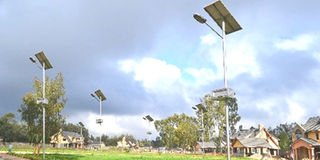MPs push for Sh3.9bn for infrastructure development

Solar powered street lights at an estate in Nairobi's Karen. If the proposal by the House Committee is implemented, street lighting within Nairobi will take Sh200 million. Photo/FILE
A parliamentary committee is pushing for an additional Sh3.9 billion for street lighting, surveillance, firefighting and the setting up of the statutory unit to midwife devolution of power and resources to the counties.
In a report to Parliament, the Local Authorities Committee has proposed that the budget of the Ministry of Local Government and that of the Ministry of Nairobi Metropolitan Development, get the extra money to run their affairs.
The Transition Authority had sought Sh403 million from the Treasury, but only got Sh100 million.
With the allocation, the House Committee is of the view that it would be “impossible” to adequately manage the devolution of resources to the Counties.
The worry from the Committee, which is chaired by Mr David Ngugi (Kinangop MP) is that the deficit is so huge, to an extent that it is likely to cripple the roll-out of devolved units.
The MPs are also pushing for a minimum allocation of Sh500 million to manage the huge garbage mounts that are an eyesore in Nakuru, Nairobi and Mombasa.
The money will be used to buy land for a “solid waste management plant”.
The lawmakers have also asked the Treasury to set aside money to clear the pending Bills for Sh659 million owed to contractors who did the job in Nairobi’s Muthurwa Market.
The Kenya Railways Pensioners’ Scheme, the MPs insist, also has to be paid Sh225 million, for the land on which an access road to the market was built.
The House Committee has also proposed that Sh250 million be allocated to the Ministry of Local Government to for the purchase of “fire equipment”.
For the markets that were built under the Stimulus Package, the committee has proposed that Sh1 billion be set up for the process.
Mr Ngugi’s team has also asked the Treasury to allocate Sh500 million to install closed-circuit television cameras in the city of Nairobi, to tame crime, and help manage the huge vehicle and human traffic.
“The CCTV is important as it would improve security within the metropolitan region and therefore spur economic growth,” the House team said. “The CCTV is useful as it would ensure connectivity of traffic lights within the city and therefore contribute to the smooth flow of traffic in the city and its environs”.
Street lighting within the capital will take Sh200 million; the mapping of the city Sh205 million and the construction of roads will take Sh850 million.
The proposals of the committee will be part of the package to Parliament in the preparation and scrutiny of the national budget for the next financial year.
The Treasury has already submitted its proposals to the House and it’s upon MPs to match the available resources to the national priorities.
If the House adopts the Committee report, the Treasury will have no option but to yield to the demands of the House.




